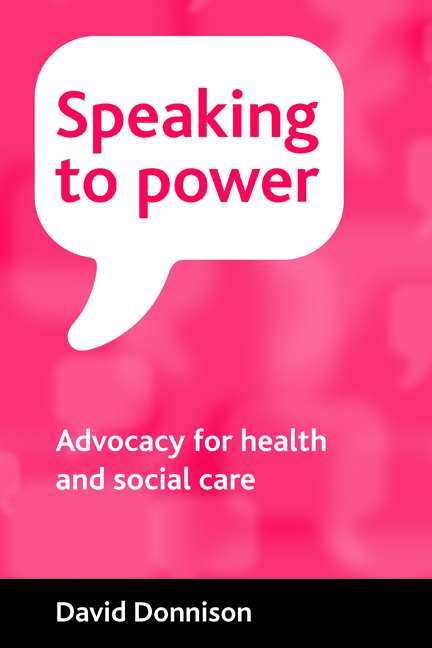Book contents
- Frontmatter
- Dedication
- Contents
- Why and how we wrote this book
- Introduction
- one Origins of advocacy
- two Scotland gives a lead
- three What advocates do: their main clients
- four What advocates do: questions and dilemmas
- five Groups and communities
- six Setting up an advocacy project and running it
- seven Volunteers
- eight Making advocacy accountable
- nine Roadblocks
- ten Looking ahead
- Further reading
- Index
three - What advocates do: their main clients
Published online by Cambridge University Press: 05 July 2022
- Frontmatter
- Dedication
- Contents
- Why and how we wrote this book
- Introduction
- one Origins of advocacy
- two Scotland gives a lead
- three What advocates do: their main clients
- four What advocates do: questions and dilemmas
- five Groups and communities
- six Setting up an advocacy project and running it
- seven Volunteers
- eight Making advocacy accountable
- nine Roadblocks
- ten Looking ahead
- Further reading
- Index
Summary
Introduction
In this chapter we describe what advocates do and discuss what we can learn from their experience. This and the next two chapters are the ‘engine room’ at the heart of our book, showing the work that has been launched as a result of the reforms traced in previous chapters and posing questions to be discussed in those that follow.
Advocates – paid staff and a few volunteers – brought the cases we describe to small meetings where they discussed them with their colleagues. With one or two exceptions these advocates all worked for the same Scottish voluntary agency. Each agency has its unique character, depending on its origins, the people who now work for it and the needs of those whom they serve. So none of them is typical of the whole network. But we are confident that the people working for other agencies of this sort will be familiar with the kinds of stories we tell and the dilemmas they pose.
Advocates choosing cases to present at these meetings were asked to bear in mind the readers for whom we are writing – particularly people who may want to become advocates, those who may have to deal with advocates in the course of other work and others preparing to enter these fields. That meant the cases presented should be real, not imaginary. They should be cases that pose interesting questions – questions that advocates find helpful to discuss with their colleagues. We were not trying to produce a typical cross-section of our work. Some of the cases have successful outcomes, but we did not want to present a succession of ‘George and Dragon’ stories – cases in which gallant advocates rescue fair maidens from dragon consultants, social workers and hostel wardens. The chapter is neither a research report nor an advertisement for advocacy. We hope it offers realistic, interesting education.
It was the responsibility of each advocate to camouflage their cases with small changes in the story – sufficient to make them difficult to identify but not so great that essential features of the story would be lost or distorted. That is why we have not attached the names of advocates or their clients to individual cases and why we do not name the agencies, hospitals or local authorities involved.
- Type
- Chapter
- Information
- Speaking to PowerAdvocacy for Health and Social Care, pp. 37 - 68Publisher: Bristol University PressPrint publication year: 2009



